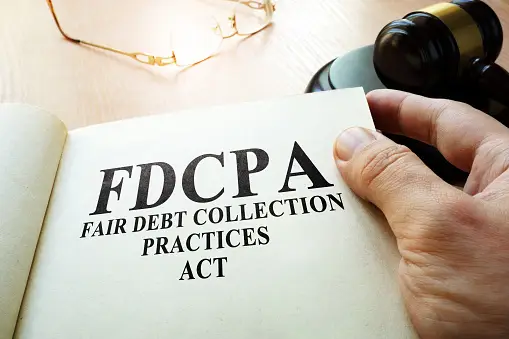Collecting a debt is often more complicated than it may appear, especially with the many state and federal laws and regulations impacting the debt collection industry.
One of the most prominent–and therefore misunderstood–debt collection regulations affecting the industry is The Fair Debt Collection Practices Act (FDCPA), which has seen enforcement expansions in recent years.
Here is a brief summary from the debt collection and recovery experts at the Monetaria Group of how the regulations impact debt collectors, as well as recent changes that may affect their enforcement.
READ MORE: How To Recover Unpaid Invoices: Commercial Debt Collection FAQ’s
What is The Fair Debt Collection Practices Act (FDCPA)?
The Fair Debt Collection Practices Act (FDCPA) serves as the primary federal law governing debt collection practices, prohibiting abusive, unfair, or deceptive practices by debt collectors.The Consumer Financial Protection Bureau (CFPB) is the governing body responsible for enforcing the FDCPA and taking action against violators. The CFPB was established by the 2010 Dodd-Frank Act. Apart from the FDCPA, the CFPB enforces various federal statutes, including the Fair Credit Reporting Act and the Truth in Lending Act.
Who Does The Fair Debt Collection Practices Act (FDCPA) Apply To?
The Fair Debt Collection Practices Act (FDCPA) is applicable to debts primarily incurred for personal, family, or household purposes. This includes most consumer debts like personal credit cards, student loans, and medical debts. To correct a common misconception, commercial business debts are not governed by the FDPA. Additionally, creditors are exempt from FDCPA compliance when attempting to collect their own debts. In-house collections departments within entities like credit card companies or hospitals fall outside the FDCPA’s purview in such instances. Similarly, third-party debt collectors who do not routinely collect debts owed to others are not obligated to adhere to the FDCPA.
READ MORE: When to Hire A Debt Collections Attorney?
What Limits Does The Fair Debt Collection Practices Act Place On How Debt Collectors Can Communicate With You About A Debt?
Time and Place Restrictions: Debt collectors are restricted in their communication times to prevent inconvenience to consumers. Generally, they are prohibited from contacting individuals at unusual times or locations, especially before 8 a.m. or after 9 p.m. If collectors are aware that personal communications are restricted at a workplace, contacting the consumer there is also forbidden. Consumers have the right to inform collectors if a call is inconvenient, prompting the termination of the conversation.
Social Media and Other Forms of Communications: Debt collectors are not allowed to publicly post about a debt on social media platforms, but can use private channels unless explicitly requested otherwise by the consumer. If electronic communication is employed, such as emails or text messages, collectors must provide a straightforward method for the consumer to opt out, ensuring transparency and respecting individual preferences.
Harassment Prevention: Debt collectors are expressly forbidden from engaging in harassment through any communication medium, including phone calls, text messages, or emails. This prohibition ensures that consumers are protected from undue stress or intimidation during the debt collection process.
Interaction with Legal Representation: If a consumer is represented by an attorney regarding a debt, the debt collector must cease direct communication with the consumer and instead contact the attorney. This rule applies if the collector is aware or can easily determine the attorney’s name and contact information.
Many states have their own laws about debt collection practices, many of which are similar-but different- to the FDCPA, so it’s advisable to stay informed about your local regulations as well.
READ MORE: What Legal Changes Affect Business Debt Collection: The Telephone Consumer Protection Act In 2024
The CFPB’s Proposed Overhaul of Debt Collection With Additional Regulations
In July 2016, the CFPB introduced proposals aiming to reshape the debt collection market. The proposed changes include requirements for debt collectors to verify the debt, strictly limit communication attempts, and provide detailed information in initial collection notices to advise the debtor of all their options. Notably, if a debtor disputes a debt, the collector must furnish a written debt report before resuming collection activities. Finally, the CFPB suggested a collector may not collect on a debt transferred from another collector with an unresolved dispute until the dispute is resolved.
READ MORE: Debt Collection Lawyer or Agency: Which One to Choose?
How to Ensure Your Debt Collection Complies With The Law
To ensure your work to recover funds owed to you is completely legal and above board, if you’re doing it yourself, make sure to read the latest news and advances in the debt collection law space and speak with debt collection lawyer-friends to make sure you’re doing everything right. If you’re working with a collection agency or debt recovery attorney-or both, like Monetaria, for example-do your research before engaging their services and ask for references to make sure they have a history of effective, legal and ethical debt collection practices.
We’re happy you found this article informative! Go back to our blog page to find more tips, tricks and guidance on collections, to ensure your business gets paid.
If you have unpaid debts that need to be recovered, commercial debt collection may be a good option for your business. A commercial debt collection agency can help you with the process of recovering past-due accounts and provide guidance on best practices for managing accounts receivable.
Led by a team of experienced commercial debt collection attorneys, Monetaria Group has lawyers for debt collection and helped hundreds of businesses recover and collect their outstanding debts and payments. Schedule a FREE consultation with our expert team to see how we can help you recover your money today!

